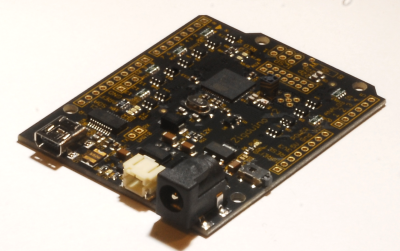mirror of
https://github.com/RIOT-OS/RIOT.git
synced 2025-01-18 12:52:44 +01:00
81 lines
3.8 KiB
Plaintext
81 lines
3.8 KiB
Plaintext
|
|
/**
|
||
|
|
* @defgroup boards_zigduino Zigduino
|
||
|
|
* @ingroup boards
|
||
|
|
* @brief Support for the Zigduino board
|
||
|
|
|
||
|
|
# Hardware
|
||
|
|
## Pinout
|
||
|
|
|
||
|
|

|
||
|
|
[Pinout](https://static1.squarespace.com/static/511f4f0de4b09463c7605f13/t/5275c46be4b07e72f74c7438/1383449707749/zigduino-r2-pinout.pdf)
|
||
|
|
|
||
|
|
@warning Unlike on other ATmega MCUs, the GPIOs are not 5V tolerant.
|
||
|
|
|
||
|
|
@note The 5V pin cannot be used to power the board, as the board is not
|
||
|
|
equipped with an voltage regulator. The pin is therefore not
|
||
|
|
connected. But it can be used to pass 5V to shields, if connected
|
||
|
|
to a 5V supply voltage.
|
||
|
|
|
||
|
|
## Board
|
||
|
|
The Zigduino board is an Arduino-compatible microcontroller platform that integrates
|
||
|
|
a SOC with a 8-Bit AVR MCU and a IEEE 802.15.4 radio chip (ATmega128RFA1).
|
||
|
|
|
||
|
|
## MCU Details
|
||
|
|
| MCU | ATmega128RFA1 |
|
||
|
|
|:------------------------------|:----------------------------------|
|
||
|
|
| Family | ATmega |
|
||
|
|
| Vendor | Atmel |
|
||
|
|
| Package | QFN/MLF |
|
||
|
|
| SRAM | 16KiB |
|
||
|
|
| Flash | 128KiB |
|
||
|
|
| EEPROM | 4KiB |
|
||
|
|
| Core Frequency | 8MHz (16MHz no power save mode) |
|
||
|
|
| Oscillators | 32.768 kHz & 16 MHz |
|
||
|
|
| Timer | 6 ( 2x8bit & 4x16bit ) |
|
||
|
|
| Analog Comparator | 1 |
|
||
|
|
| ADCs | 1x 15 channel 6 to 12-bit |
|
||
|
|
| USARTs | 2 |
|
||
|
|
| SPIs | 3 (1 SPI & 2 USART SPI) |
|
||
|
|
| I2Cs | 1 (called TWI) |
|
||
|
|
| Vcc | 1.8V - 3.6V |
|
||
|
|
| Datasheet / Reference Manual | [Datasheet and Reference Manual](http://ww1.microchip.com/downloads/en/DeviceDoc/Atmel-8266-MCU_Wireless-ATmega128RFA1_Datasheet.pdf) |
|
||
|
|
| Board Manual | [Product Page](http://www.logos-electro.com/store/zigduino-r2) |
|
||
|
|
|
||
|
|
The MCU comes with a 2.4 GHz IEEE 802.15.4 radio that is compatible with the
|
||
|
|
Atmel AT86RF23x line of transceivers with the only difference being that it is
|
||
|
|
not being accessed over an SPI bus, but instead the radio registers are directly
|
||
|
|
mapped into memory.
|
||
|
|
|
||
|
|
# Flashing RIOT
|
||
|
|
Flashing RIOT on the Zigduino is done using the on-board USB-TTL adapter.
|
||
|
|
The ATmega bootloader is present on the MCU.
|
||
|
|
Simply use
|
||
|
|
|
||
|
|
`make flash BOARD=zigduino`
|
||
|
|
|
||
|
|
# Use on IoT Lab
|
||
|
|
|
||
|
|
Most of the Zigduino nodes are deployed in the Strasbourg site with sensors.
|
||
|
|
Some of these nodes are also combined with a LoRa modem in order to offer a dual radio stack IEEE 802.15.4/LoRaWAN.
|
||
|
|
|
||
|
|
There are two available configurations:
|
||
|
|
|
||
|
|
## Zigduino (atmega128rfa1)
|
||
|
|
|
||
|
|
A basic Zigduino nodes with embedded sensors:
|
||
|
|
|
||
|
|
- [Grove Temperature Humidity sensor](https://wiki.seeedstudio.com/Grove-Temperature_and_Humidity_Sensor_Pro/) (pin 14, A0)
|
||
|
|
- [Grove Light sensor](https://wiki.seeedstudio.com/Sensor_light/) (pin 15, A1)
|
||
|
|
- [Grove Loudness sensor](https://wiki.seeedstudio.com/Grove-Loudness_Sensor/) (pin 16, A2)
|
||
|
|
- [Grove PIR Motion sensor](https://wiki.seeedstudio.com/Grove-PIR_Motion_Sensor/) (pin 4, D4)
|
||
|
|
|
||
|
|
## Zigduino (atmega128rfa1_rn2483)
|
||
|
|
This is an extension of the previous Zigduino (atmega128rfa1)
|
||
|
|
|
||
|
|
- Secondary serial port (LoRa modem): 57600 bauds
|
||
|
|
- [RN2483](https://ww1.microchip.com/downloads/en/DeviceDoc/RN2483-LoRa-Technology-Module-Command-Reference-User-Guide-DS40001784G.pdf) modem with 1.0.3 firmware (LoRaWAN Class A only)
|
||
|
|
- TX (pin 1, TXD1)
|
||
|
|
- RX (pin 0, RXD1)
|
||
|
|
|
||
|
|
*/
|